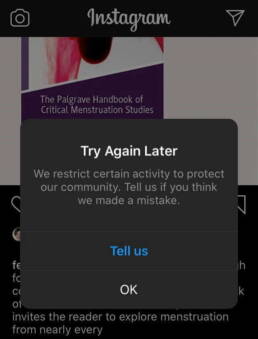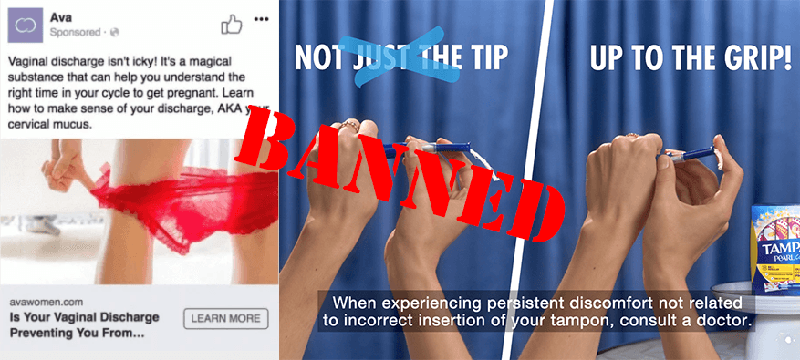Looking at gender discrimination in advertising policies.
For the 2021 D&AD New Blood Awards, we teamed up with Refinery29 on a brief that asked emerging creatives to reposition menopause as an issue that can affect anyone of any age. The 15 winners of this brief produced thought-provoking and inspirational content, but there is just one problem: How do you bring an issue out of the shadows when social media platforms refuse to advertise anything related to it?

It’s true. Platforms like Facebook and Instagram have a long history of censoring content around female sexual wellness while still allowing marketing targeted towards the male audience. The Case for Her has experienced a temporary block on Instagram, so have our friends at The Pleasure Project—and we’re not the only ones.
When Polly Rodriguez entered early menopause because of life-saving cancer treatment, she found herself searching for ways to reclaim her body and sexuality. What she found is that the sex shops she entered weren’t designed with women in mind. After a few awkward encounters, Polly decided to launch a company that would provide the products and shopping experience that she was searching for—Unbound.
Today Unbound is a leading sextech company that produces beautifully designed and affordable products to help people explore pleasure. Unfortunately for Polly and Unbound, they have not been allowed to advertise these products on social media. How will a startup succeed if it cannot find its audience in a world where marketing can make or break you?
The crux of the matter isn’t just that these platforms aren’t allowing ads related to women’s sexual health. It’s that they do allow those that have to do with men’s. From erectile dysfunction pills delivered right to your doorstep to the “perfectly engineered ball hair trimmer,” the fact is that products and services for men don’t face the same level of scrutiny as those for women.


Something has to give
The Center for Intimacy Justice (CIJ) is the first organization dedicated to securing intimacy equality, and its current project is taking on gender inequalities in advertising policies. The CIJ has teamed up with sexual health and pleasure experts on a petition to end this sexual wellness censorship on social media—it currently has over 1,000 signatures. Most recently, the CIJ has been working with the physical therapy service Origin to collect stories from companies that have faced advertising discrimination. This partnership comes after several of Origin’s ads about women’s pelvic floor health were banned by multiple social media networks.
According to Jackie Rotman, Founder and CEO of the CIJ:
“Companies can develop their algorithms and rewrite their policies to establish equality in advertising practices; it’s simply a matter of will. Of saying that female health matters. Of companies like Facebook listening to and valuing women — the vast majority of users on their platform, especially on Instagram — enough to develop ad policies that are just and equitable. People of all genders deserve access to information about their wellbeing and health — yet Facebook’s ad practices are currently saying that erectile dysfunction is worthy of treatment above others, while information about menopause, endometriosis, and menstrual health is systematically censored, in 2021.“
Get involved
There are a few ways you can join this fight:
- Make a financial contribution to The Center for Intimacy Justice. As a non-profit organization, the CIJ relies on outside donations to keep its programs running.
- Share your experience. If you or your organization have been silenced or censored for talking about women’s health, tell your story.
- Amplify the voices of others. Sign the petition to end sexual wellness censorship and share other stories when you come across them. The CIJ is just getting started on social media, but you can follow it on Twitter and Instagram to stay in the loop.
Being quiet about these topics only reinforces the stigma that women’s sexual health is pornographic and something to be ashamed of. Let’s raise our voices so the next generation of innovators and entrepreneurs in women’s sexual health has every opportunity to succeed.
Co-Founder of The Case for Her


